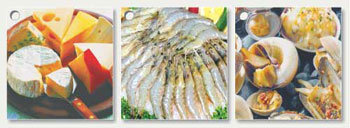No Problem for Growing Children and Teenagers
No Problem for Growing Children and Teenagers
Posted March. 28, 2004 22:58,

- The Medical World of Cholesterol
Cholesterol has two faces. Too much can cause sclerosis of the arteries, heart attacks, and myocardial infarction. Too little can cause deficiency in various hormones, which can lead to depression. Cholesterol is especially necessary for children and teenagers, as it one of the main components of cell membranes.
An elevated level of cholesterol in blood does not show apparent symptoms at once. Rather, it acts like a calm devil that slowly invades your body. In serious cases, yellow bumps that look like tumors can appear on the skin from accumulation of cholesterol. They usually appear on eyelids, backs of the hands, knees, and elbows. The 1 centimeter thick Achilles tendon also thickens to 1.5 to 2 centimeters.
Cholesterol is produced in the liver or absorbed through food. It moves around in the blood and can be divided into LDL or HDL cholesterol types.
Suppose that the human body is factory. LDL supplies the material (cholesterol) around the factory. LDL becomes waste after being used up. If the LDL amount is reasonable, no problem arises since the liver takes care of it. However, if it exceeds that level, LDL sticks to the cell membrane, causing illness.
On the other hand, HDL has the job of throwing out that waste to the incinerator. It prevents disease and cures it. That is why LDL is usually called bad cholesterol, while HDL is called good cholesterol.
- Food and Cholesterol
Housewives share a common concern, wondering whether it is okay to feed their children foods high in cholesterol. These products include seafood, such as shrimp, clams, and squid; dairy products, such as cheese and butter; and meat, such as pork and beef.
Doctors mostly say that such foods do not cause serious problems. In the U.S., babies under two years of age are not restricted from eating cholesterol. Also, cholesterol related treatment usually begins after adolescence, because growth is more important during this time. Doctors recommend nutritious foods like seafood, even if they are high in cholesterol.
By eating products high in cholesterol, your bloods cholesterol levels will not necessarily increase. The level of cholesterol in blood increases when there is a high level of saturated fat. As shrimp or crab have less saturated fat than red meat, it is unlikely that they will increase your blood cholesterol level, even though they have more cholesterol.
Unfortunately, there is no way to just absorb good cholesterol HDL. This is because the cholesterol in food divides into HDL and LDL only after it enters the body.
It is possible, however, to ensure that much HDL is produced in the body. Exercising to decrease fat, one or two glasses of alcohol a day, and using vegetable oil (which has a lot of linolic acid) can all help. You must use care though to eat products with vegetable oil immediately, as the food will change to saturated fat when kept out too long.
On the other hand, reusing oil will increase LDL levels. The fat in the yoke of an egg can also contribute to LDL production. As the cholesterol level in egg yokes amount to 200 mg, it is not wise to eat more than two eggs a day. Smoking, of course, must be strictly prohibited.
(Assistance from Prof. Han Ki-hoon of the Seoul Asan Hospital internal circulation dept., and Prof. Seong Ji-dong of the Seoul Samsung Hospital internal circulation dept.)
corekim@donga.com







